Interview by Penny Rafferty // Sept. 21, 2018
Ben Elliot treads a fine-line between vacuous consumerism and crushingly emotional terrains. At first glance, you may write this Parisian off as an influencer, party-boy or even a troll, but his soft, off-the-cuff quips and delicate positing of slang and attention economy leave you reflecting on a certain lifestyle (that chances are you buy into, too). His work is made up of selfies, pop-up shops, products and books, all of which fall under the weighted genre of conceptual art, a genre that reflects upon forms of language and epistemological methodology. Elliot replays and reproduces the operations of an immaterial labour of the now so convincingly because he lives it, too: he is not an imitation, he is a product of himself, society, capital and us — the viewer, the reader, the audience.
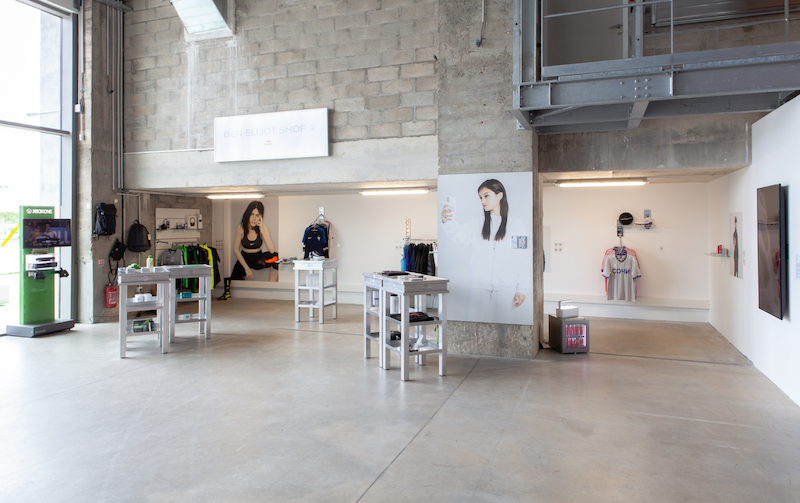
Ben Elliot: ‘Ben Elliot Shop – Energized by Red Bull’, 2018. Exhibition view, Magasins Generaux, Paris, France // Courtesy of the artist
Penny Rafferty: Your work centres around local branding, of the self, its environment and its peers. This is not an unusual tactic as such, yet it’s often commonly found in photography rather than mixed media installation. I’m thinking Dash Snow, Nan Goldin, Wolfgang Tillmans, and the list goes on. Can you tell me a little about your scene and your horizon?
Ben Elliot: I enjoy society’s mechanisms: how you construct yourself, communicate with others and build businesses, brands, trademarks, using your image. The internet, smartphones, social media, networking, branding and influencing, are the major communication tools of my generation. I like to work with them and use them to disseminate ideas that are new and in the making. My frame goes from making a party, social media posts, or a pop-up store, to launching collaborations and products with industries I believe have interesting concepts, both online and IRL. I am more and more interested in the mechanisms of the art market: what is perceived as buyable vs. institutional contemporary art, so the projects I am currently working on are integrating painting and sculpture.
I love the fact that today you can play in different fields. I am very careful to always build projects that make sense for wider audiences, so that everyone can just enjoy a good party event, shop in a concept store, or drink water without necessarily viewing it with the distance or depth that is supposed to go with an artwork.
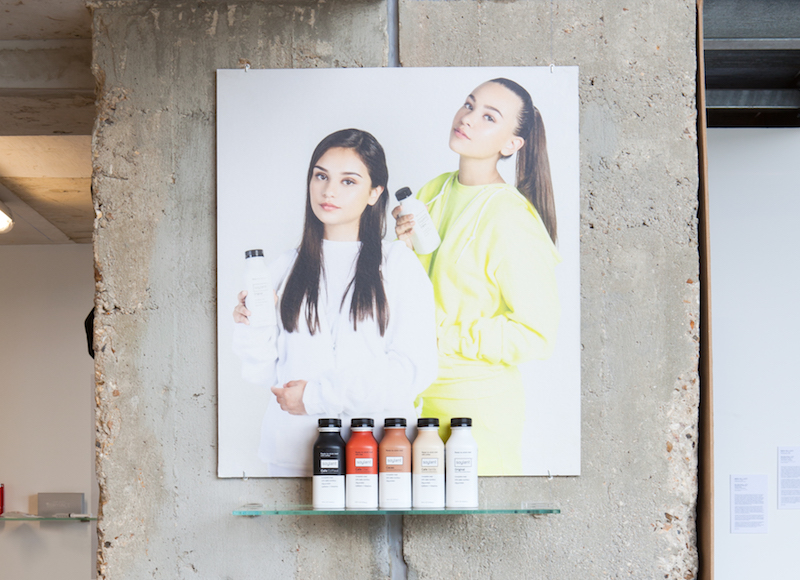
Ben Elliot: ‘Ben Elliot Shop – Energized by Red Bull’, 2018. Exhibition view, Magasins Generaux, Paris, France. Featuring American Apparel, Soylent // Courtesy of the artist
Penny Rafferty: Technology and “lived life” seem to be the key materials you use, in this form of self-sculpturization: basic objects like the iPhone right?
Ben Elliot: Right! I collaborate with people and objects that often associate values of the technological evolution with the utility of everyday life. My most recent project, Ben Elliot Shop – Energized by Red Bull, gathered more than 50 companies and entities that respond to these problematics. They are active in the fields of sportswear, smart food, augmented beauty or social networks, which are respectively some of the most advanced forms of clothing, food, cosmetics, and entertainment. Partners such as Nike, Red Bull, Champion, Under Armour, Salomon, Microsoft, Xbox, Fnatic, Soylent, LuMee, Gosha Rubchinskiy, @lil_wavi and Meitu have been instrumental for me to depict the promises of technology for a more beautiful, better and stronger life. These brands spread new lifestyle experiences and shape our way to Artificial Intelligence.
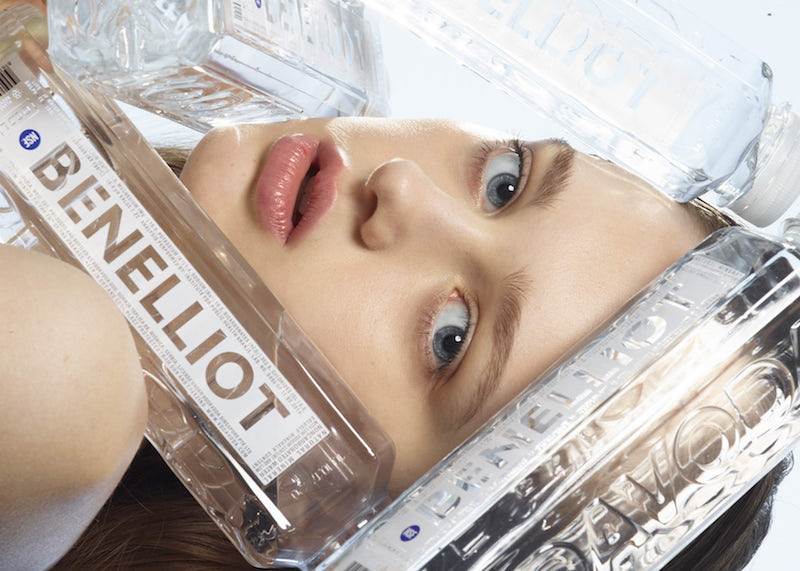
Ben Elliot: ‘Ben Elliot Water’, 2017. Campaign picture // Courtesy of the artist, photography Charles Negre
Penny Rafferty: For this month’s topic, I instantly thought of your water bottles but I quickly realized I didn’t know anything about them. I only knew of the images that had resonated over my social feeds. I looked on your website and found this quote: “Water is the first product of life, the basic one we are and consume every day. Everybody needs water. It’s the best product.” I fully understand your logic, especially in a world that lives by an eight-glasses-a-day regime, but personally I think it wasn’t the fluid that brought you to water, it was the image of the bottle. Can you explain this project in more depth?
Ben Elliot: Well, I wanted to launch my e-shop in 2017 with a first product and collaboration. It had to be the most common and basic product. Water is also an old but guaranteed technology. It is where we come from, it’s the key to life. I am personally a water addict and it made sense to start with a product I like and know the most, because I use it every day.
Obviously, it also had a lot to do with self-branding and merch – getting back to your previous question – and an interest in growing my social media game through a shoppable experience, building a brand with myself to expand a community and develop creative and smart entertainment (that art is).
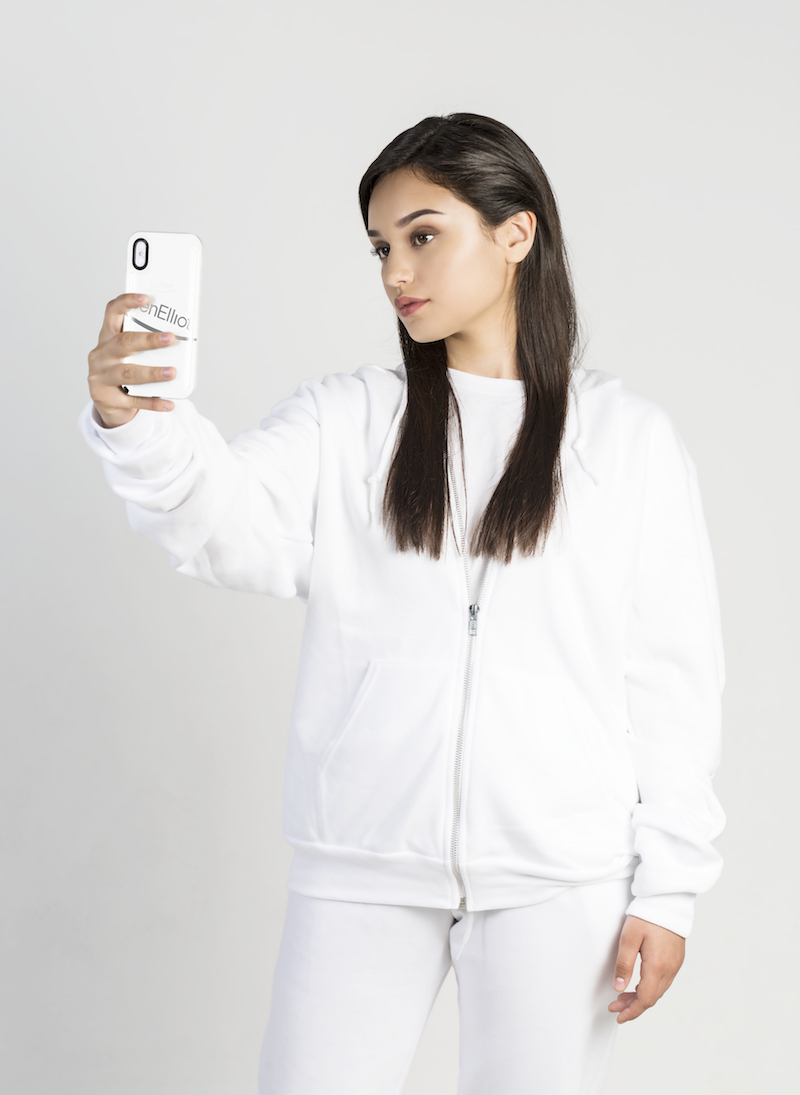
Ben Elliot: ‘Ben Elliot Shop – Energized by Red Bull’ (Saskia with American Apparel and LuMee), 2018, Campaign picture // Courtesy of the artist
Penny Rafferty: Are you empathetic to branding? I ask this not only in relation to the water, but your books such as ‘Diary’ and works like ‘Camera Roll’.
Ben Elliot: Of course, I am very sensitive and responsive to branding. Personal branding is what interests me the most. Self-presentation is more and more important at the time of social networks and the communication society we live in.
Storytelling is fundamental to branding and it has been a key tool in my last projects, including ‘Diary’ and ‘Camera Roll’. A few months ago, I exhibited my full ‘Camera Roll’ with all the selfies, pictures, videos, screenshots etc., directly on an iPhone accessible in the exhibition. It is like the making of my thinking, life and projects. My life as an individual is the object of a work itself, and this work documents other works and their setbacks. I used to write my diary in my Instagram captions too and then printed a book of it all. In the end, I just amplify or make visible what everyone is doing from their own level.
Penny Rafferty: I read ‘Diary’ in one sitting, it’s easy rolling spread of things; love, life, lack, crush, food, water… I could relate to scrolling across my laptop. I loved the poetic sayings such as “Selfies are my introspection” and “bored beyond infinity”. But I see how other people, who aren’t in such pop-linguistic circles, could read this as vacuous and tedious. Are you trying to express something to a reader/viewer from outside of your social sphere? Or do you have to be an insider to “love” this for its delicate vulnerability?
Ben Elliot: Both, I guess. ‘Diary’ is like an emotional testimonial of our time, written with the language of our time, made of lols and emojis. You definitely have to be an insider to fully understand it but at least it offers a door to this world you may not be familiar with. If you don’t get it at all linguistically, then you can focus on the concept, which I believe is as important as the meaning of the text.
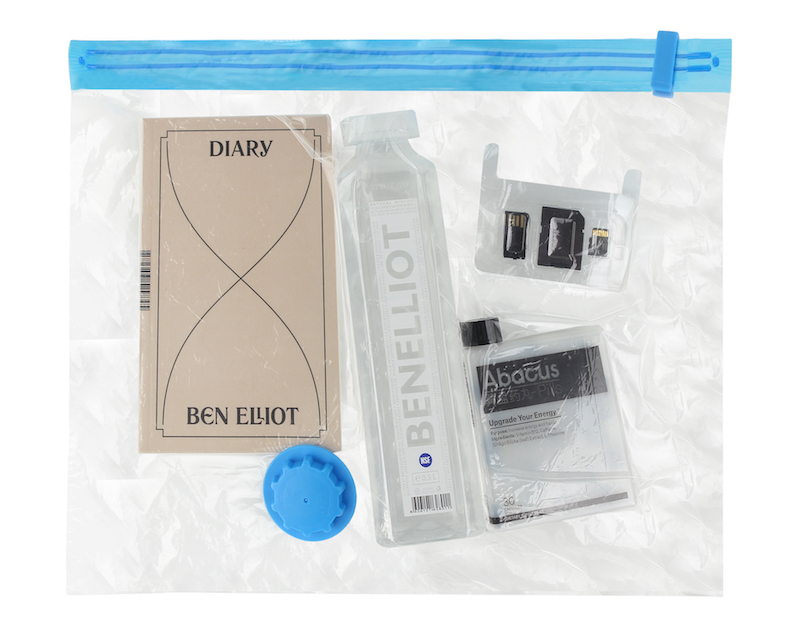
Ben Elliot: ‘Birthday Collection’, 2018. Campaign picture. Featuring Abacus Pills, Ben Elliot Water, Diary, The Stalker // Courtesy of the artist
Penny Rafferty: Ok but there is a certain vulnerability. The work ‘Diary’ seems very surface at first, almost emo—with phrases like “I wanted to write with blood but I just had water” or “this is so puuuuure I’m in love”—but the more I read the more its a rhetoric of societal emotional conduct. And you have had real repercussions from your openness, right? As in ‘The Stalker’…
Ben Elliot: Yes, absolutely. ‘Diary’ is kind of an open book of my life and emotions at a time when I was looking for myself in the present social structures, how to deal with being born as a 2.0 human and chasing the self-achievement that we are all looking for.
About repercussions, ‘The Stalker’ is probably one of them, yes. Unusual openness makes some people respond extremely, I guess. It has been almost 2 years that someone is stalking me on every platform every day. As I sit here writing to you, it seems that the stalker is in my city, Paris. I gathered all the content from the first year as an archive file. It includes about 1000 screenshots of Instagram, Snapchat, WhatsApp, emails, phone messages, phone calls, videos, voice messages, pictures, etc. I just did it to get something positive out of it, and it is an interesting documentation to feed most of the subjects I deal with in my work.
Penny Rafferty: It’s also a really intense space of emotive practice, it makes me think of Allan Kaprow. He was a self-described “un-artist” whose practice fought to produce Art as Life. I see you as a new generation of this mythos.
Ben Elliot: I am thankful to artists like Kaprow, also Warhol, who worked to blur the lines between art and entertainment, and many others who opened the path for the next generations of creatives not to be locked into one category.
As far as I am concerned, though, I would define myself as an artist but also enjoy working in other industries and combining them with art so that something fresh comes out of it in terms of ideas, process and economy.
This article is part of our monthly topic of ‘Water.’ To read more from this topic, click here.
Exhibition Info
EXO EXO
Ben Elliot: ‘MakeupPlus’
Exhibition: Oct. 10–27, 2018
10 ter rue Bisson, 75020 Paris, click here for map


























